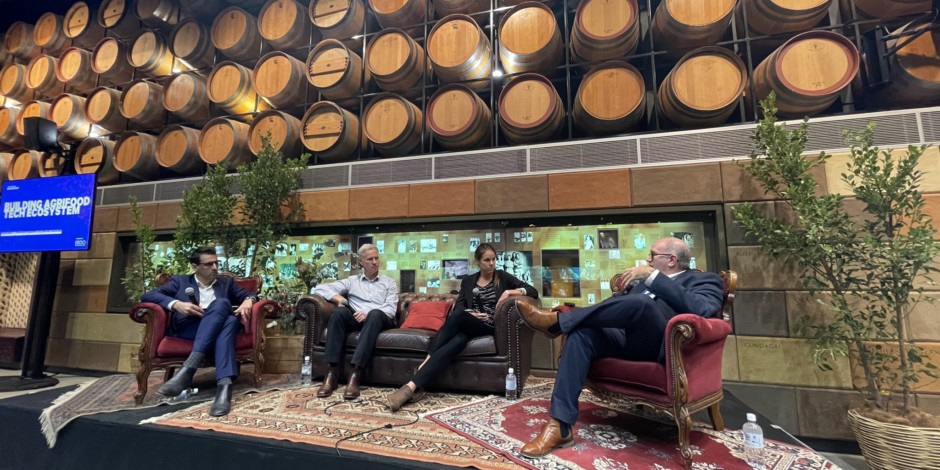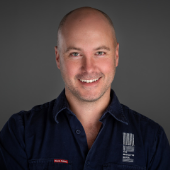‘The missing ingredient’ for Australian food tech startups
Internationally recognised food scientist, Professor Martin Cole of The University of Adelaide's Waite Campus explains why South Australia needs a food innovation pilot plant and taking a venture science approach leads to breakthroughs.
 Martin Cole talks about agrifood innovation at _Southstart, Adelaide 2021.
Martin Cole talks about agrifood innovation at _Southstart, Adelaide 2021.
Internationally recognised food scientist, Professor Martin Cole of The University of Adelaide’s Waite Campus explains why South Australia needs a food innovation pilot plant and taking a venture science approach leads to breakthroughs. The Waite Campus in Adelaide, is the largest agrifood hub in the Southern Hemisphere. It’s run by Martin Cole, who became the Head of Ag, Food & Wine at the University of Adelaide, after a decade working with CSIRO where he led the venture science approach and supported startups such as v2food.
The Waite’s residents span the agribusiness supply chain, including SARDI (South Australian Research & Development Institute), CSIRO, AWRI (Australian Wine Research Institute), the University of Adelaide, The Plant Accelerator, Food SA, ThincLab for the startup community, and The Fight Food Waste Cooperative Research Centre (CRC). Industry involvement is clearly strong, however, Martin sees a lack of focus on value-adding and the absence of a food pilot plant, as weak links that need fixing.
When Jack Cowin of Hungry Jacks approached Martin whilst at CSIRO, it was the $50million state-of-the-art food pilot plant at Werribee that enabled concepts from their scientists to be transformed from lab concepts, into something consumers could taste. Gaining access to this research and development food innovation pilot plant, ultimately led to the creation of v2food’s Rebel Whopper.
The venture science approach, integral in the development of v2foods, saw a cross-disciplinary team come together to address the opportunity and market trends around sustainability and protein demand. Hungry Jacks were the initial go-to market partner, Main Sequence Ventures provided the capital, Nick Hazell joined as the CEO, bringing with him company creation and scaling experience, whilst CSIRO brought its deep science knowledge, such as how proteins fold and structure, and how flavours form in meat. The years of research from CSIRO meant, that unlike competitors such as Impossible Foods and Beyond Meat, v2foods didn’t have to spend years building a research team from scratch.
RELATED: Vow’s path to success and the rise of cultured proteins
Martin explained they wanted to create a vehicle that would go faster than anyone else. “Over 50 products were initially prototyped in the first sprint, and by going fast it created a vortex that kept the momentum up.” This momentum led to v2foods recent $20m investment into a production facility in Wodonga. Although it can be confronting to scientists to take a lean-startup approach Martin said, “I saw the benefits of the change in the research dynamic, as everyone was aligned to lean in from the outset, and focus entirely on the success of the company.”
Venture science approach integral in creating commercial opportunities
CSIRO and Main Sequence have replicated the venture science approach through supporting the development of a suite of other food tech startups, such as Nourish Ingredients, all aimed at the mission of feeding 10bn people by 2050 in a more sustainable way. Ensuring these companies, developed a prototype and acquired sales early on was pivotal in their trajectory, Martin explained. When Martin initially met Eden Brew, a startup that makes products such as milk proteins and dairy products without the animal – his first thought was to “give me something I can try” before he was won over. Eden Brew has gone on to raise $4m and partner with dairy co-op Norco to scale up production.
Now finding himself in South Australia, surrounded by dryland agriculture, Martin’s challenge is to turn that system into premium foods rather than just a commodity export. He said the humble faba bean presents one of those opportunities.
The Waite Campus currently leads the national breeding program for faba beans, and they’re currently planted primarily as a break or commodity crop, with a 5-year average price of around $440/tonne. Martin wants to re-frame faba beans as being the foundation for a plant-based meat alternative, and says “putting them on price parity with minced beef, would result in a x20 delta in value. This could take an industry currently valued at $160m, to one being worth over $3bn, with the additional value being distributed to everyone across the value chain.”
RELATED: ThincLab supports MisterRYE create plastic-free drinking straw with organic rye
SARDI already have a dry fractionation plant to double the protein levels, as well as creating starch and fibre rich streams. but Martin sees that there are still more opportunities to support this growth.
“Currently the missing ingredient is a food pilot plant which would provide a plug-and-play environment to test new technologies, carry out short term trials for food brands, as well as providing an incubation environment for food tech startups.”
The Waite has recently completed its strategic plan, with a food pilot plant as one of the key components. “In order to maximise the opportunity for the Australian agrifood sector, we need to get to a point where it makes commercial sense to move the transformed product rather than the raw materials,” Martin explained. The Waite’s scientific capabilities continue to grow with the internationally regarded Plant Accelerator on campus, soon joined by the eagerly anticipated Food Accelerator facility. If you’re interested in working with The Waite, please find contact details here.
Enjoyed this story? Want to learn more about the Asia Pacific region’s innovative agrifood tech ecosystem? Sign up for our newsletter here and receive fresh stories about global leaders, farmers, startups and innovators driving collaborative change.
